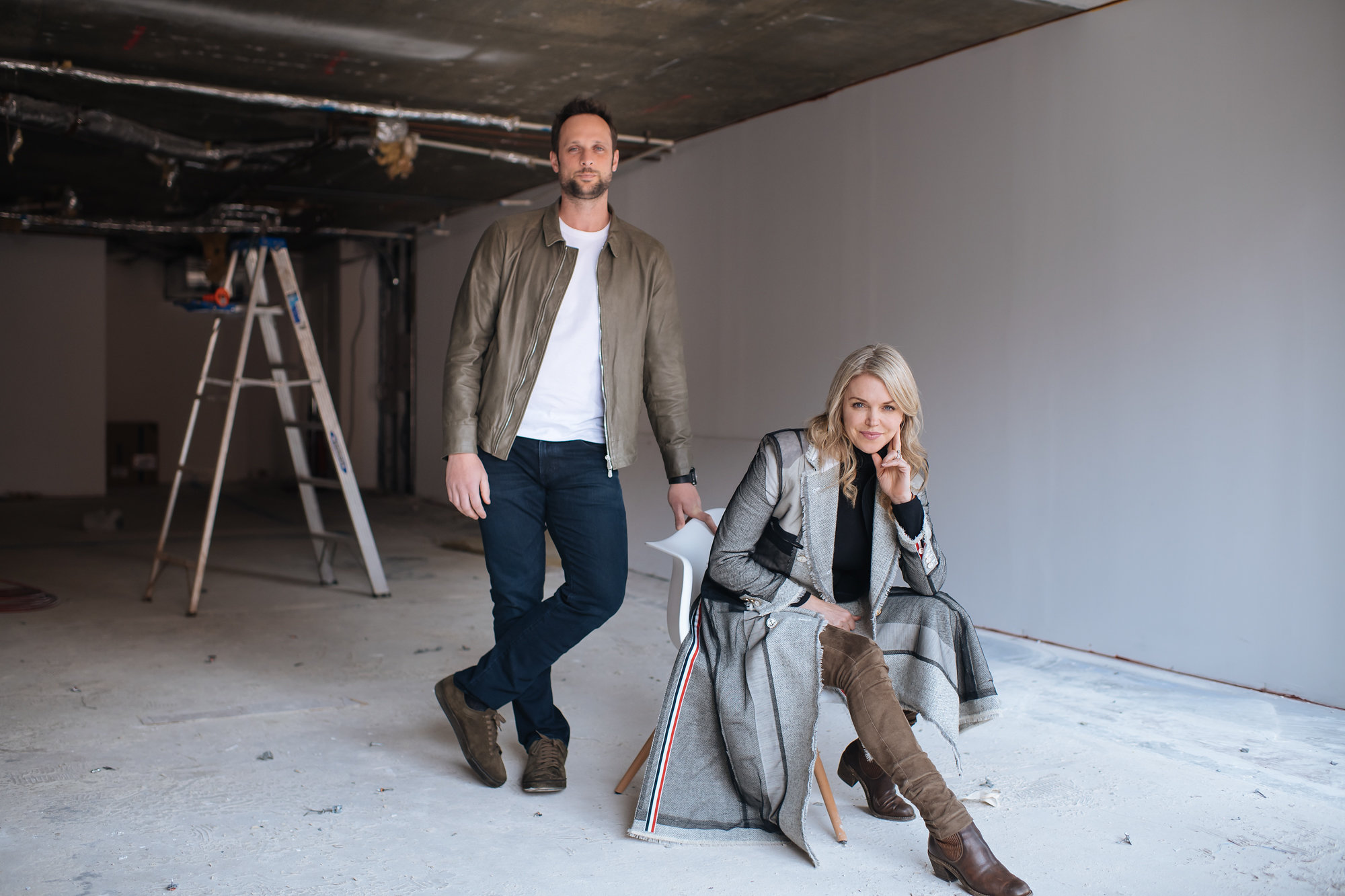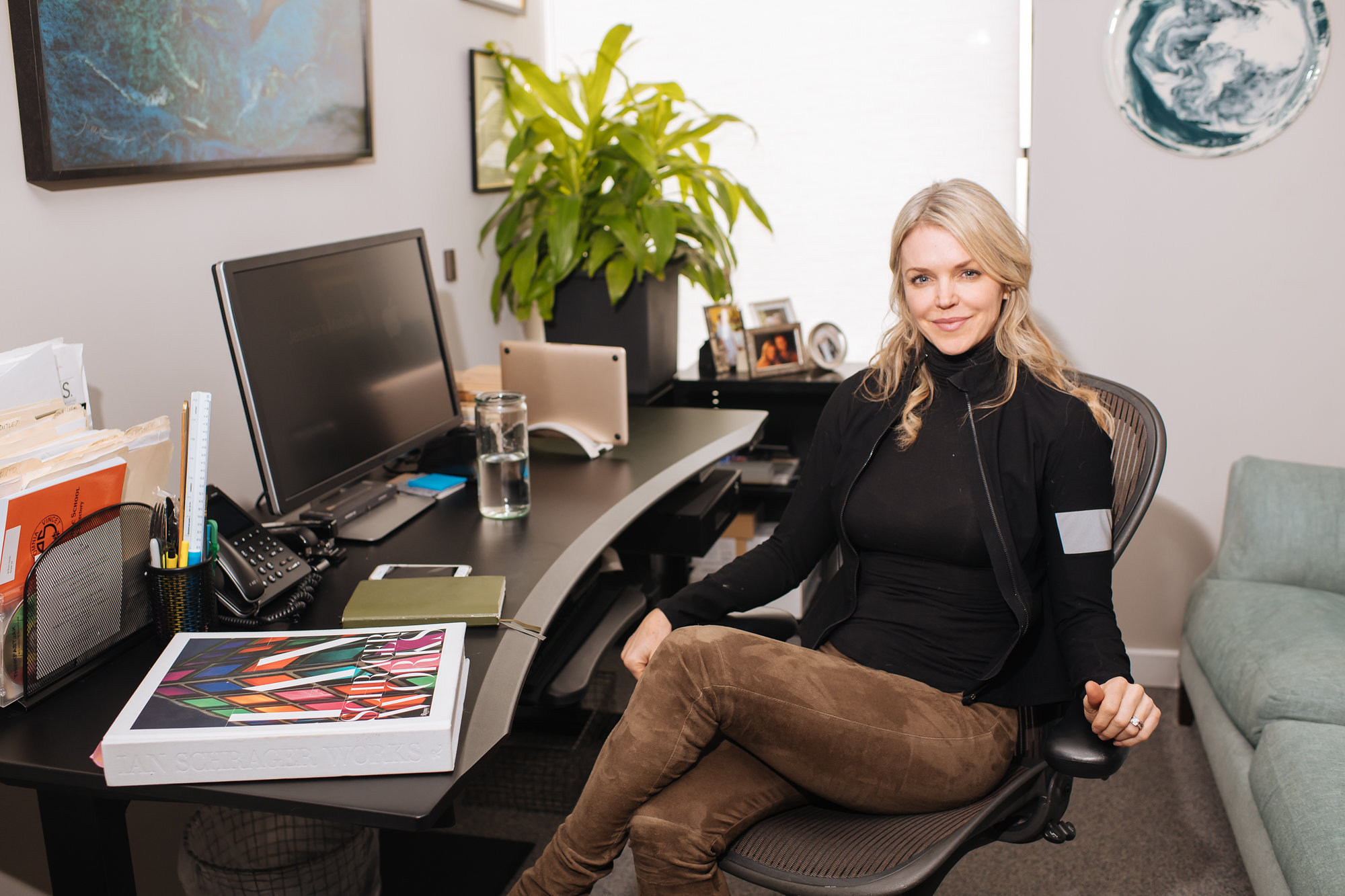‘I Was Fascinated With This Little Microcosm’
A few years ago, most people looked at the run-down alley off of Grace Street and saw nothing but trash and defunct pieces of equipment. They looked next door and saw troubling rent rolls. Jessica Glass looked at both, and saw the little Georgetown side street that could.
Seemingly, the Chief Operating Officer and Principal at Basil Street Management followed a vastly different career path from that of her artist parents. Yet she says it’s their tenacity and creativity that pushed her through the development of one of the neighborhood’s most overlooked corners—today, anchored by Grace Street Collective, and future home to former minibar chef Johnny Spero’s new restaurant, Reverie.
‘Tenacity and creativity—they’re your best friends when you’re trying to create something no one else saw. What if we looked at it this way, or that way? Within the community of entrepreneurs who do commercial real estate, you bring them around the corner and they’re high-fiving looking at trash cans. Their minds start percolating. Most people would be like, who would ever want to put a fine dining restaurant in a back alley? Well, they might do that because it’s really interesting, and it’s unexpected.’
Interesting and unexpected—adjectives that have come to encapsulate Jessica’s life. Her grandparents owned a CBS affiliate that they sold while she was attending GW, prompting Jessica to study innovations in electronic media. She received a Master’s degree in radio technology, and worked for a wireless cable company start-up in Charlottesville after graduation.
Eventually, she moved to Texas to work for the Houston Chronicle Interactive—one of the first newspapers to ‘figure out online.’
‘We were the first newspaper to put marathon times on the Internet. It was 1993, 1994. It was a fun time to figure out what does it mean to take journalism online?’
Two years later, Jessica was headhunted by Microsoft, and began commuting to Seattle as their director of marketing. But after six years, she was married and ready to start a family.
‘I couldn’t do Microsoft and have kids. You were going in at 7 and working until 11. If it was a really sunny day in Seattle, that was the only time you left the office.’
Jessica left Microsoft and had three children, earning another Master’s degree in psychology to ‘keep’ her brain while she was home with the kids. By the time they were in upper school, Jessica and her husband were divorced, and she had to face the next phase of her life.
‘I felt really strongly about Georgetown because it always seemed to be the place I came back to. I was fascinated with this little microcosm.’
Along the way, Jessica met Ezra Glass, whom she married last year. They both had business backgrounds, and Jessica had some capital from a previous business. Together, they created a commercial real estate investment effort designed with the family in mind. The goal was simple—do some interesting projects that had an impact.
‘The thing I kept feeling about Georgetown is, it feels hard to find our little niche here. We felt there was a little hole. But we didn’t think you could solve it with one thing, and we didn’t know if we could get any contiguous space.’
It took two years before Jessica and Ezra found 3210 Grace Street. The street was dead—neither Dog Tag Bakery nor Chaia there yet—but the space was exactly what they’d dreamt of finding.
‘Ezra really has his finger on the pulse of things that are interesting and fun. He doesn’t settle for anything that’s normal. We wanted to take this building and try to create this cross pollinating, cool little place where the tenants are interacting. We like creating communities on the commercial level, as well as the customer level.’
Jessica and Ezra hand-picked each tenant—SUNdeVICH, Grace Street Coffee Roasters and South Block Juice Co. all opening in early 2016. A smoked fish shop, wine concept, and the popular cycling clothing and accessories brand Rapha will all open later this year.
‘We’re kind of relentless when we think it’s a good fit. I talked to the smoked fish guys for a year and half. I kept saying, ‘You don’t understand how important some smoked fish would be!’’
Jessica says she has a backlog of tenants interested in the building, all of whom see Grace Street as the best way to access what often feels like an inaccessible commercial market.
‘What I’ve found is a lot of people have really fond feelings about Georgetown, but they think it’s untouchable. We’re demystifying that with some untraditional ways you can access this market.’
Although Grace Street Collective’s early success was largely through word of mouth, Jessica acknowledges the key role technology has played in side street ventures.
‘The fact that you can put an address in your phone and walk to this place is a critical piece of the equation. Before, if you didn’t know exactly where something was, you just wouldn’t go. The fear has gone away. Being on a side street is cool now. It’s this idea of being on the periphery that’s part of the attraction, and not trying to be in the middle of everything.’
All of Jessica’s tenants are unique—on the periphery in some way—yet they pass the same test.
‘I don’t want you in the building if Amazon can completely steal your business overnight. If a consumer experience feels at all like typing it into a computer and hitting buy, just do it at home. When it stops being a commercial thing and becomes an experience, that’s when it becomes fun. The lines are going to blur a little bit. It’s going to be a space where creativity wins.’
Jessica says DC is much more alive and vibrant than the ‘lame, political city’ it once was during her college days. With that comes more competition than ever from other commercial districts, but she sees that as another opportunity.
‘When everyone is zigging in the city, we’re zagging into Georgetown. You can try as hard as you want with The Wharf or any other place, but Georgetown has an intrinsic beauty you can’t replicate. Things ebb and flow and trend, and I feel like as we have a couple of successful restaurateurs rearing their heads, we can pull a lot of energy back here.’
Jessica and Ezra are eager to find one more swath of property in Georgetown for a larger collaboration. Meanwhile, all of their remaining Grace Street tenants are scheduled to open this year. Jessica says it’s a relief to reach the end of that process, but it’s the clean slate that she finds most inspiring.
‘I love bringing my children in when it’s totally bare bones and saying, ‘This is going to be something else. Someone is imagining it, and then they’re going to create it, and then it’s going to be here.’’






